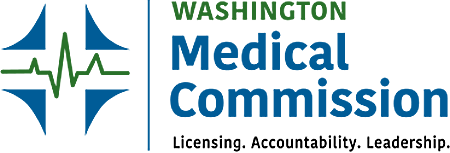Error Reduction and the Future of Communication and Resolution Programs
This webinar occurred on March, 25, 2021.
Join the Washington Medical Commission for an educational opportunity on Communication and Resolution Programs. The webinar will cover:
- The WMC’s work on reducing medical error.
- The benefits of implementing a CRP and disseminating lessons learned.
- The science behind CRPs and error reduction.
- Resources to make an organization CRP successful.
Target Audience
This activity is designed to educate health care practitioners, risk management staff, and the public.
Educational Objectives
Upon completion of this educational activity, participants should be able to:
- Recognize how open and empathetic communication with patients reduces adverse events.
- Discuss a system to disseminate lessons learned from CRP events.
- Assess how an organization can focus on error reduction rather than punitive action.
Speaker Biographies
Jimmy Y. Chung, MD, MBA, FACS, FABQAURP, CMRP
As Associate Vice President, Perioperative Portfolio for Providence, Dr. Chung is responsible for development and integration of perioperative strategies, working with physicians and operational stakeholders across the 51-hospital system. He has also spoken at numerous national conferences as an expert on development of physician leadership in optimizing the cost, quality, and outcomes of healthcare. He received his MD from UC San Diego and completed his surgery residency at University of Washington. He has served on the Washington Medical Commission since 2017 and is the Chair of the Reduction of Medical Errors Committee. He is Board Certified in Surgery and Health Care Quality Management and is a fellow of the American College of Surgeons and a fellow of the American Board of Quality Assurance and Utilization Review Physicians.
Michael L. Farrell, JD. Policy Development Manager
Michael Farrell is the Policy Development Manager for the Washington State Medical Quality Assurance Commission. He has served as an attorney for the Commission for 29 years assisting the Commission in the licensing and disciplining physicians and physician assistants; developing legislation, rules, policy, guidelines, and performance measures; and educating the profession and the public on medical regulation. Michael helped the Commission develop its guideline: A Collaborative Approach to Reducing Medical Error and Enhancing Patient Safety. Prior to working for the Commission, Michael was an attorney in private practice in Seattle. He holds a J.D. from Marquette University Law School and a B.B.A. in economics and management science from Gonzaga University.
John Maldon, Medical Commission Chair
John Maldon has worked in Risk Management for over 40 years. Mr. Maldon began his career in risk management at a large insurance carrier specializing in medical malpractice. He worked with the University of Washington in developing the University’s Risk Management Department followed by working on a national program of Risk Management focusing on consulting with physicians promoting patient safety. Mr. Maldon has most recently retired from an executive position at a managed care health provider with a focus on medico/legal financial risk management. Mr. Maldon has been a WMC commissioner for the past six years and is currently chair of the commission.
Continuing Medical Education
Accreditation Statement
This activity has been planned and implemented in accordance with the accreditation requirements and policies of the Accreditation Council for Continuing Medical Education (ACCME) through the joint providership of the Federation of State Medical Boards and the Washington Medical Commission. The Federation of State Medical Boards is accredited by the ACCME to provide continuing medical education for physicians.
Credit Designation Statement
The Federation of State Medical Boards designates this internet enduring activity for a maximum of 1.0 AMA PRA Category 1 Credit™. Physicians should claim only the credit commensurate with the extent of their participation in the activity.
Course Director
Alden Roberts, MD
Washington Medical Commission
Commercial Support
This learning activity is not funded by any commercial entity.
However, the Washington Medical Commission gratefully acknowledges the unrestricted educational grant from the FSMB Foundation in the amount of $10,000 to support this activity.
Disclosure of Commercial Interest
As an organization accredited by the ACCME, the Federation of State Medical Boards (FSMB) requires that the content of CME activities and related materials provide balance, independence, objectivity, and scientific rigor. Planning must be free of the influence or control of a commercial entity and promote improvements or quality in healthcare. All persons in the position to control the content of an education activity are required to disclose all relevant financial relationships in any amount occurring within the past 12 months with any entity producing, marketing, re-selling, or distributing health care goods or services consumed by, or used on patients.
The ACCME defines “relevant financial relationships” as financial relationships in any amount occurring within the past 12 months that create a conflict of interest. The FSMB has implemented a mechanism to identify and resolve all conflicts of interest prior to the activity. The intent of this policy is to identify potential conflicts of interest so participants can form their own judgments with full disclosure of the facts. Participants will be asked to evaluate whether the speaker’s outside interests reflect a possible bias in the planning or presentation of the activity.
The speakers, course director and planners at the Federation of State Medical Boards and the Washington Medical Commission have no relevant financial interests to disclose.
Disclosure of Unlabeled Uses
This educational activity may contain discussion of published and/or investigational uses of agents that are not approved by the U.S. Food and Drug Administration. For additional information about approved uses, including approved indications, contraindications, and warnings, please refer to the prescribing information for each product, or consult the Physicians’ Desk Reference.
Faculty and Staff Disclosures
No speakers or persons in control of content reported intent to reference unlabeled/unapproved uses of drugs or products.



